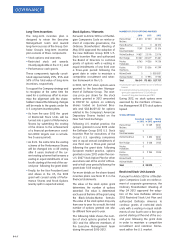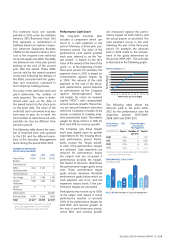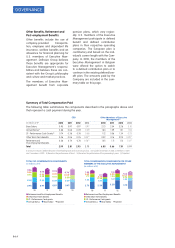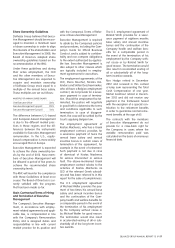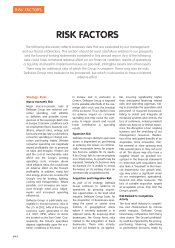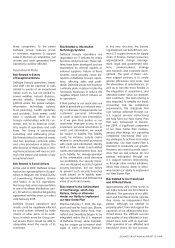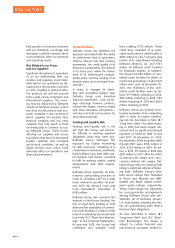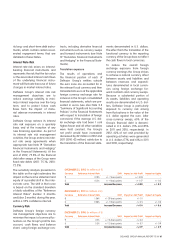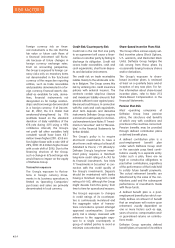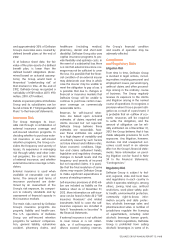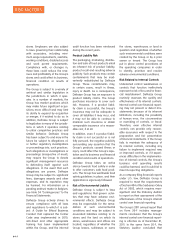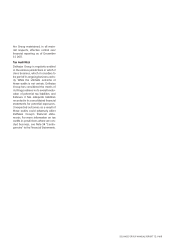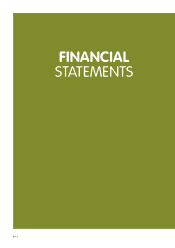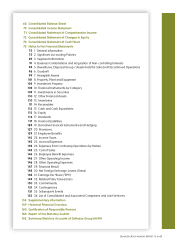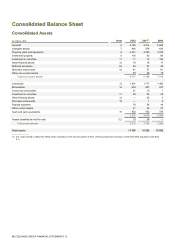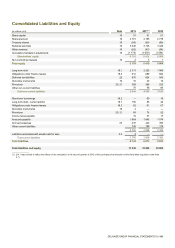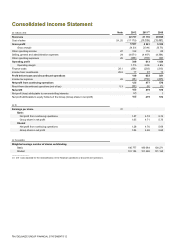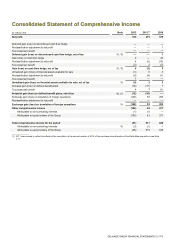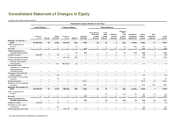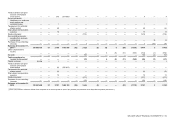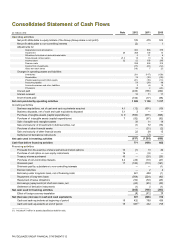Food Lion 2012 Annual Report Download - page 66
Download and view the complete annual report
Please find page 66 of the 2012 Food Lion annual report below. You can navigate through the pages in the report by either clicking on the pages listed below, or by using the keyword search tool below to find specific information within the annual report.
64 //
stores. Employers are also subject
to laws governing their relationship
with associates, including mini-
mum wage requirements, overtime,
working conditions, disabled access
and work permit requirements.
Compliance with, or changes in,
these laws could reduce the reve-
nues and profitability of the Group’s
stores and could affect its business,
financial condition or results of
operations.
The Group is subject to a variety of
antitrust and similar legislation in
the jurisdictions in which it oper-
ates. In a number of markets, the
Group has market positions which
may make future significant acqui-
sitions more difficult and may limit
its ability to expand by acquisition
or merger, if it wished to do so. In
addition, Delhaize Group is subject
to legislation in many of the jurisdic-
tions in which it operates relating
to unfair competitive practices and
similar behavior. Delhaize Group
has been subject to and may in the
future be subject to allegations of,
or further regulatory investigations
or proceedings into, such practices.
Such allegations or investigations or
proceedings (irrespective of merit),
may require the Group to devote
significant management resources
to defending itself against such
allegations. In the event that such
allegations are proven, Delhaize
Group may be subject to significant
fines, damages awards and other
expenses, and its reputation may
be harmed. For information on a
pending antitrust matter in Belgium,
see Note 34 ”Contingencies” to the
Financial Statements.
Delhaize Group actively strives to
ensure compliance with all laws
and regulations to which it is sub-
ject. A Guide for Ethical Business
Conduct that replaced the former
Code was implemented in 2010,
anti-fraud and other appropriate
training has been implemented
within the Group, and the internal
audit function has been reinforced
during the recent years.
Product Liability Risk
The packaging, marketing, distribu-
tion and sale of food products entail
an inherent risk of product liability,
product recall and resulting adverse
publicity. Such products may contain
contaminants that may be inad-
vertently redistributed by Delhaize
Group. These contaminants may,
in certain cases, result in illness,
injury or death. As a consequence,
Delhaize Group has an exposure to
product liability claims. The Group
purchases insurance to cover such
risk. However, if a product liabil-
ity claim is successful, the Group’s
insurance may not be adequate to
cover all liabilities it may incur, and
it may not be able to continue to
maintain such insurance or obtain
comparable insurance at a reason-
able cost, if at all.
In addition, even if a product liabil-
ity claim is not successful or is not
fully pursued, the negative publicity
surrounding any assertion that the
Group’s products caused illness or
injury could affect the Group’s repu-
tation and its business and financial
condition and results of operations.
Delhaize Group takes an active
stance towards food safety in order
to offer customers safe food prod-
ucts. The Group has worldwide food
safety guidelines in place, and their
application is vigorously followed.
Risk of Environmental Liability
Delhaize Group is subject to laws
and regulations that govern activi-
ties that may have adverse envi-
ronmental effects. Delhaize Group
may be responsible for the reme-
diation of such environmental
conditions and may be subject to
associated liabilities relating to its
stores and the land on which its
stores, warehouses and offices are
located, regardless of whether the
Group leases, subleases or owns
the stores, warehouses or land in
question and regardless of whether
such environmental conditions were
created by the Group or by a prior
owner or tenant. The Group has
put in place control procedures at
the operating companies in order
to identify, prioritize and resolve
adverse environmental conditions.
Risk Related to Internal Controls
Undetected control weaknesses or
controls that function ineffectively
represent a risk of loss and/or finan-
cial misstatement. Delhaize Group
routinely assesses the quality and
effectiveness of its internal controls.
Internal control over financial report-
ing may not prevent or detect mis-
statements because of its inherent
limitations, including the possibility
of human error, the circumvention
or overriding of controls, or fraud.
Therefore, even effective internal
controls can provide only reason-
able assurance with respect to the
preparation and fair presentation
of financial statements. If the Group
fails to maintain the adequacy of
its internal controls, including any
failure to implement required new
or improved controls, or if it experi-
ences difficulties in the implementa-
tion of internal controls, the Group’s
business and operating results
could be harmed, and it could fail to
meet its reporting obligations.
As a company filing financial reports
under U.S. law, Delhaize Group is
required to meet the requirements
of Section 404 of the Sarbanes-Oxley
Act of 2002, which requires man-
agement and the Statutory Auditor
to report on their assessment of the
effectiveness of the Group’s internal
control over financial reporting.
The Group’s 2011 annual report filed
on Form 20-F includes manage-
ment’s conclusion that the Group’s
internal control over financial report-
ing is effective as of December 31,
2011. In the same Form 20-F, the
Statutory Auditor concluded that
RISK FACTORS


